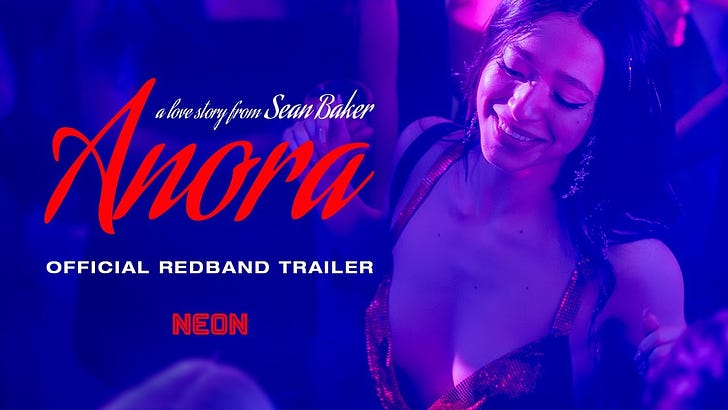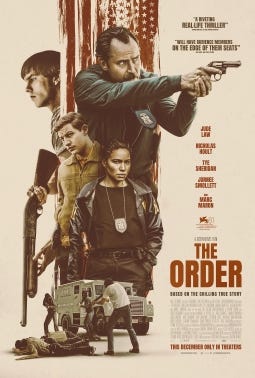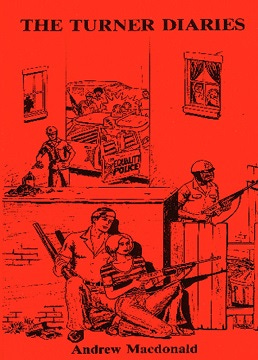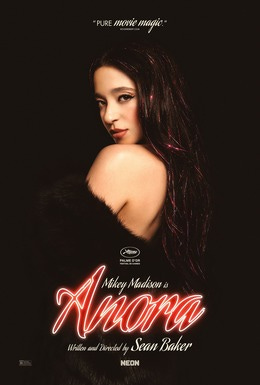I saw two movies — The Order and Anora — this past weekend, both of which are likely to stay with me for some time because of what they are really about — belonging, defeat, desire and disappointment — and what they say about present-day American life. Every film review is in some sense autobiographical — at least the ones I do — so pay attention, especially if you’re one of my enemies or suing me in federal court.
Both films are likely to be discussed in the context of awards — Anora won the Palme d’Or — and I think both are worthy of your attention if you’re trying to get a sense of where the zeitgeist is. If you want to be reductionist you could say that The Order is about zealotry while Anora is about harlotry. The Order is a very male film about brotherhood while Anora is about women’s liberation taken so far you’re enslaved. In other words they are both very American films.
The Order is set in the West while Anora is set in Brighton Beach, save a quick interlude at Deseret High Command — Las Vegas, founded by the Mormons naturally — where our young lovers are wed and then unwed.
I saw The Order with someone who was actually born where its protagonist met his end. He is a man of the East born in the West while I am a man of the West born in the East.
We watched it at the theater down by the Potomac in Georgetown with the nice seats, me and his young girlfriend and him. Yeah, I was the third wheel. What of it? If you’ve ever been to that theater you know it’s the sort of place where a bunch of white people can feel special because there aren’t many of us there. So of course we saw the white nationalist film at the black movie theater. Seemed like a good idea at the time. I was a little disappointed that I didn’t get the black experience in the white nationalist bio pic but the brothers just don’t go for that sort of movie apparently. What a shame.
Anyway I watched Anora alone, save for two other filmgoers who also went alone.
The Order concerns an obsessive FBI agent who takes on a white separatist group that was active in the Pacific Northwest during the 1980s while Anora documents the travails of a Uzbek-Russian-American stripper who falls for and marries the son of a Russian oligarch. Neither plot is terribly interesting in itself but both plots serve to talk about wider themes of exploitation, belonging, conquest, despair — all the stuff you’re not really supposed to think much about but which are critically important to every day life.
Here are the trailers.
Now I used to go to the movies all the time. When you’re young it’s a great place to hang out to escape your problems. When you’re old it’s a great place to hang out to escape your problems. My family life was decidedly unstable and we didn’t have a TV or much heating so I’d often go to the movies on the weekend and see damn near every picture. I’m not sure my fourteen year old self understood many of the adult themes I’d watch but I’d stew in the movie theaters, marinating in the smell of strangers and spilled popcorn. Sometimes I’d fall asleep and that was fine, too.
This movie going habit continued when I lived near an arthouse theatre during and after college. I’d bike down, sneak in some snacks, and just take it in. Sometimes I’d bring a date but mostly I’d go alone and just disappear for a few hours. When I’m stressed out I still do this sort of thing. It resets my mind, especially if I do it after not eating through the weekend. When I was poor I fasted to save money but as I got older I did it mostly to help me hallucinate through the weekend before I could escape once more into the work that I say gives my life meaning and which, if I’m honest, sometimes really does.
America is a lonely country and L.A. is perhaps our loneliest city. I lived for many years on its outskirts, far away from the glitterati — my closest family a continent away — fully immersed in the smog, strip malls; I was well acquainted with the flickering desert sun and the fanaticism that comes from being far away from the East Coast action or the effete and detached cool poise of Malibu, the Valley and the West Side.
I’ve often thought that the reason the movie industry took off there is that everyone is in their cars or confined to their homes. They can disappear into their television or into the cinema and for a time at least leave it behind. Who needs therapy when you have good old fashioned escapism? And who doesn’t want an escape?
It’s trite to say but I think that that his escapist impulse animates a lot of what passes for the narcissistic impulse to, say, storm the Capital or do a mass shooting. People want to commit themselves totally to the role because so much of life seems so safe. Luigi Mangione is the main character in his story but his script sucks. He’s imprisoned in himself long before genomic genealogy and facial recognition finally caught up to him. Brian Thompson is voiceless, corporate and dead.
Ostensibly The Order is about a white nationalist outfit led by Bob Matthews, who was a real person. It stars Brits Nicholas Hoult as Matthews and Jude Law as the divorced dad of the deep state lawman destined to bring Matthews down. Aussie Justin Kurzel directs and June Smollett, sister of disgraced Jussie Smollett, stars as an FBI agent. OK, whatever. It’s apparently shot in Alberta and not Idaho or Eastern Washington state.
In essence Matthews, enamored of the cartoonishly ridiculous Turner Diaries, seeks to foment a violent insurrection in the Western United States. He and his band are caught, of course, but not without assassinating minorities, trafficking weapons, robbing banks and armored cars, and bombing a few porno theaters.
Stop me if you’ve heard this one before but the author of The Turner Diaries describes their enemy as The System — a loose network of America’s most powerful institutions, allegedly run by the Jews, naturally. Why is it called The System? Well presumably because The Deep State or Curtin Yarvin’s The Cathedral wasn’t yet dreamed up. Fight the System, man! Fight it for me, okay? You go do the revolution, pal.
It’s not discussed in the film — or if it is, I missed it — but Matthews distributes some of the money he got doing his Jesse James routine to other white nationalist groups elsewhere in the country. The specter of a violent insurrection is raised and the credits tell us that Matthews and his supporters were influential to at least some of the folks who showed up at January 6th. Maybe, but then again, maybe not.
For a moment you think this might be a kind of Westerner but then Matthew declares war on America. He arrives as a sort of nowhere man. You don’t hear anything real about his motivations — it’s hate, you see, because these guys are losers seeking to blame someone else for their problems — and you’re supposed to believe that. But is it true? You’re told that he’s done in by his infertile wife, who is jealous that he’s impregnated another woman. She says “you won’t take Bob alive” and she’s right, of course. Matthews dies of smoking inhalation after a standoff with about seventy-five law enforcement officers. In the film he supposedly killed a few of them; in real life he didn’t.
Matthews’s motivation isn’t fully explored. They try to make it about poverty. Matthews lost everything, you see, because his father was poor. But the real Matthews daddy was the president of the Chamber of Commerce. His father and he even purchased sixty wooded acres in Washington State. His mother was his Cub Scout den mother. Hardly a hard childhood.
Matthews joined the John Birch Society and when he turned sixteen Matthews was baptized as a Mormon. Ah yes, the Mormons. You won’t hear anything about this in The Order film. No introspection about what it means. Nor is there even a mention of the John Birch Society. Nor the John Birch Society’s ties to the Mormon Church and how the Church did all it could to get the FBI — which it also dominated — from investigating the John Birch Society. (My own grandfather tangled with these Mormons and John Birch Society supporters who had a concerted project of taking over school boards throughout the country. Sound familiar?)
When you put it in this context you can compare the looting that Matthews was doing to that of the Mormon raiders who enslaved people coming West to California.
Vengence is Mine book details many examples.
“Multiple raids on emigrant wagon trains in Utah Territory, both before and weeks after September 11, 1857, demonstrate that the train massacred at Mountain Meadows was not the only one attacked. These assaults were motivated by political wrangling over federal and local rule and tensions between church and state that reached a deadly peak in 1857 but roiled Utah for decades. Modern readers may recognize similar tensions today, not only in Utah but throughout the United States. This jostling for power between Latter-day Saints and federal authority continued long after the massacre. Attempts to wield the case as a political weapon resulted in justice delayed—and justice denied—for the innocent victims of the massacre and their families.” (Richard E. Turley. Vengeance Is Mine: The Mountain Meadows Massacre and Its Aftermath. Oxford University Press, 2023. Apple Books.
What if Bob Matthews was simply continuing the tradition with his own raids? Matthews as a Mormon hero is something that’s hard for modern America to understand but it’s there if you look close.
Matthews created the Sons of Liberty, an anti-communist militia whose members were Mormon survivalists. (Rather funnily that’s also the name of Peter Thiel aide Jeff Giesea’s novel about the American Revolution. Jeff is also Mormon. Make of that what you will.)
The Order was itself a splinter group from the Sons of Liberty with apparently the Mormon and gentiles having a fight over how to do the revolution. Hate it when the splinter groups splinter about how to splinter America.
I’m sometimes derided for talking about the crypto Mormons who guide a lot of our politics. You see the conventional story is that you get to choose your religion — just say the Nicene creed or the shahada and you’re good to go, bing bada boom — but there are plenty of religions for whom its in the blood, where it isn’t so much a faith but a lineage. By all accounts Matthews thought exactly like that. If that’s true it’s a bit harder to eradicate than simply closing a few temples or busting a few heretics.
Now I can totally understand why that’s a strange thing to people who live in the cocoon of BosWash whose denizens find it hard to understand that level of devotion.
Watching the film I was reminded of what a British friend of mine once said that — that America’s greatest threat came from within and with all the cults operating far from the reach of the Washington D.C. More terrifying still is the cults using their dues to buy political power. Matthews meets another white nationalist leader — a suit and tie type — who tells him not to be so aggressive and that his more respectable brand of white nationalism will ultimately win out. They’ll elect senators and congress, dontcha know. Matthews is having none of it. He wants the revolution now.
There’s also always been the question of how foreign-backed these kind of splinter groups are. You’re not allowed to think about Fred Koch’s ties to the John Birch Society — and the Nazis and Soviets. If they were foreign backed in the past are they foreign backed now?
Right before the raid on Matthews’s last redneck redoubt Jussie Smollett’s sister asks Jude Law’s character about all the sacrifices he has made.
She asks, “Is it worth it?” He says, “What do you think?”
To the film’s credit it asks us rather than tells it.
There’s a kind of suicide to excellent work.
Civilization requires the divorced dads of the deep state who have nothing else but the job — nothing but the Christ-like devotion to duty. But greater love hath no man…
It’s impossible to talk about Anora without talking about Pretty Woman to which the film makes homage but I think that’s too easy and I don’t really like Julia Roberts. Her smile scares me.
It’s also hard to talk about a Sean Baker film without mentioning The Florida Project, which I saw a few years ago while in Florida and which I watched and then jumped up and said, “ Yes! Yes! This is why I hate this godforsaken state! Yes! Fuck Orlando!” I said all of that while in Orlando and then looked around just to be safe and got out of the state.
The opening of Anora tells us what sort of thing this film is. Our star Mikey Madison is filmed seducing men and doing stripteases and lap dances. “Wow,” says I to myself. “I’m really glad I didn’t go to this movie with my mother or sister. What are these other two fellas doing here?”
It’s a lot a lot and much of the film’s first third is a kind of orgiastic display of excessive Russian bad taste. Still it’s fun in the way that all young people enjoying life is.
We empathize with Anora or “Ani,” as she’s called because she seems like she has it together. Does she? I guess we’ll see. You root for her to get hers and maybe even one over on the Russians who are exploiting her.
There is part of her that we love. She wants better working conditions. She’s not going to get them. She’s tough. She’s conniving. She’s probably Jewish in that way that all New York women are. Not that there’s anything wrong with that! The oligarch too is Russian-Jewish.
I don’t go for strip clubs. Not my thing. I prefer having my heart broken as the waitress returns my card and she tells me she’s pregnant with someone else’s kid. Or that she’s a lesbian. Or that she wants to work on her music career. Or her parents’ don’t like me. You know, relatable heart break.
But given that the line between dating and prostitution is blurry and practically nonexistent in the Russian world I certainly understand where a lot of the strip club appeal comes from. Strippers understand men in a way that’s jarring probably because they understand us all too well. I don’t like that kind of vulnerability.
There’s a kind of equality in disappointment. And you can think of the strip club as a tune up rather than a real experience. I like to think of it as those guys who really like going to the mechanics.
Over the years I suspect — OK, I know — that some of the women I have gone out with turned out to be strippers. No, I didn’t pursue them but in the main they did me a lot less damage than the women who professed to love me.
But as you get older you’re looking for an escape. I get it. Maybe the strip club is for other people the way the cinema is for me.
A friend of mine’s son managed strip clubs and he told me he had learned a lot about human nature. “Like what?” I asked. “You don’t want to know,” he replied. That kind of knowledge is as interesting as it is disturbing.
Mostly I find the whole strip club experience very exploitative, for stripper and strip club joiner alike. The last time I went to a strip club I went with Hoan Ton-That, the cofounder of Clearview.AI. In those days we were friends. Now I am suing him for exploiting me. Maybe I deserve that for all the exploitation I’ve done in this life or past lives. hard to say.
But maybe that’s America, too — just everyone exploiting everyone else all the time with the hope that maybe, just maybe, this time will be different. Of course this being America, it is sometimes quite different.
Bruno Maçães’s History Has Begun: The Birth of a New America posits that America is an amusement park. For foreigners that’s certainly true. For Americans?
I happen to think it’s not really a country but a casino. Casinos feature prominently in Anora. “God Bless America,” says Vanya, the Russian oligarch’s kid in the strip club, and there’s a diversity of every kind of man and not a few women wandering into the club.
I used to go to casinos but I don’t go to them anymore. I live in America, the biggest casino of them all. Why spoil the fun?
The final scene of Anora will stay with me for a very long time. I don’t want to spoil it. Go see it.






